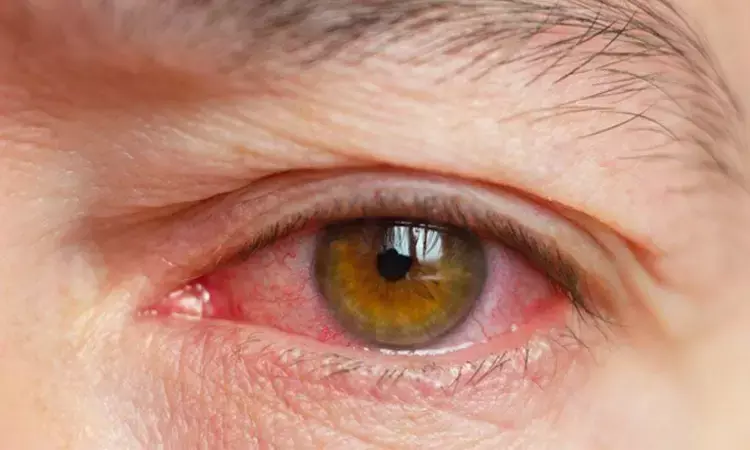- Home
- Medical news & Guidelines
- Anesthesiology
- Cardiology and CTVS
- Critical Care
- Dentistry
- Dermatology
- Diabetes and Endocrinology
- ENT
- Gastroenterology
- Medicine
- Nephrology
- Neurology
- Obstretics-Gynaecology
- Oncology
- Ophthalmology
- Orthopaedics
- Pediatrics-Neonatology
- Psychiatry
- Pulmonology
- Radiology
- Surgery
- Urology
- Laboratory Medicine
- Diet
- Nursing
- Paramedical
- Physiotherapy
- Health news
- Fact Check
- Bone Health Fact Check
- Brain Health Fact Check
- Cancer Related Fact Check
- Child Care Fact Check
- Dental and oral health fact check
- Diabetes and metabolic health fact check
- Diet and Nutrition Fact Check
- Eye and ENT Care Fact Check
- Fitness fact check
- Gut health fact check
- Heart health fact check
- Kidney health fact check
- Medical education fact check
- Men's health fact check
- Respiratory fact check
- Skin and hair care fact check
- Vaccine and Immunization fact check
- Women's health fact check
- AYUSH
- State News
- Andaman and Nicobar Islands
- Andhra Pradesh
- Arunachal Pradesh
- Assam
- Bihar
- Chandigarh
- Chattisgarh
- Dadra and Nagar Haveli
- Daman and Diu
- Delhi
- Goa
- Gujarat
- Haryana
- Himachal Pradesh
- Jammu & Kashmir
- Jharkhand
- Karnataka
- Kerala
- Ladakh
- Lakshadweep
- Madhya Pradesh
- Maharashtra
- Manipur
- Meghalaya
- Mizoram
- Nagaland
- Odisha
- Puducherry
- Punjab
- Rajasthan
- Sikkim
- Tamil Nadu
- Telangana
- Tripura
- Uttar Pradesh
- Uttrakhand
- West Bengal
- Medical Education
- Industry
Orbicularis-sparing and orbicularis-excising blephroplasty equally effective for dry eye syndrome: Study

A recent double-blind, randomized clinical trial investigated the impact of different surgical techniques on Dry Eye Syndrome (DES) in patients undergoing bilateral upper eyelid blepharoplasty (ULB). The findings were published in the journal of Graefe’s Archive for Clinical and Experimental Ophthalmology.
The study was conducted from 2017 and 2019 compared orbicularis-sparing versus orbicularis-excising methods to assess both subjective and objective DES metrics.
Aesthetic procedures like the upper eyelid blepharoplasty (ULB) are common interventions for various functional and cosmetic reasons. Concerns of Dry Eye Syndrome (DES) post surgery have prompted this rigorous investigation into the comparative effects of two different surgical techniques.
This double-blind, randomized trial included a total of 63 patients who underwent routine functional ULB. The patients were divided into a group receiving the orbicularis-sparing technique and the other receiving the orbicularis-excising technique. A set of subjective and objective DES assessments were conducted preoperatively and at 1 month and 1 year postoperatively.
Standard Patient Evaluation of Eye Dryness (SPEED) scores demonstrated a decrease in both groups at both postoperative intervals. This improvement was consistent across the surgical techniques employed. The objective DES assessments which consisted of seven metrics did not significantly change postoperatively for any group.
The study revealed a association between the severity of preoperative DES symptoms and the degree of subjective improvement postoperatively. This suggests that patients with more pronounced symptoms pre-surgery experienced a more significant subjective relief after the procedure regardless of the surgical technique employed.
The findings suggest that neither the orbicularis-sparing nor the orbicularis-excising technique for ULB worsens subjective or objective DES metrics. This provides the surgeons and patients with reassurance to employ these approaches confidently without exacerbating dry eye symptoms.
Source:
Mian, O. T., Lippe, C. M., Khan, A., Bugg, V. A., Bryant, J. C., Riaz, K. M., Dvorak, J. D., Ding, K., & Moreau, A. (2023). Dry eye in the upper blepharoplasty patient: a study comparing orbicularis-sparing versus orbicularis-excising techniques. In Graefe’s Archive for Clinical and Experimental Ophthalmology (Vol. 261, Issue 12, pp. 3625–3634). Springer Science and Business Media LLC. https://doi.org/10.1007/s00417-023-06131-
Neuroscience Masters graduate
Jacinthlyn Sylvia, a Neuroscience Master's graduate from Chennai has worked extensively in deciphering the neurobiology of cognition and motor control in aging. She also has spread-out exposure to Neurosurgery from her Bachelor’s. She is currently involved in active Neuro-Oncology research. She is an upcoming neuroscientist with a fiery passion for writing. Her news cover at Medical Dialogues feature recent discoveries and updates from the healthcare and biomedical research fields. She can be reached at editorial@medicaldialogues.in
Dr Kamal Kant Kohli-MBBS, DTCD- a chest specialist with more than 30 years of practice and a flair for writing clinical articles, Dr Kamal Kant Kohli joined Medical Dialogues as a Chief Editor of Medical News. Besides writing articles, as an editor, he proofreads and verifies all the medical content published on Medical Dialogues including those coming from journals, studies,medical conferences,guidelines etc. Email: drkohli@medicaldialogues.in. Contact no. 011-43720751


